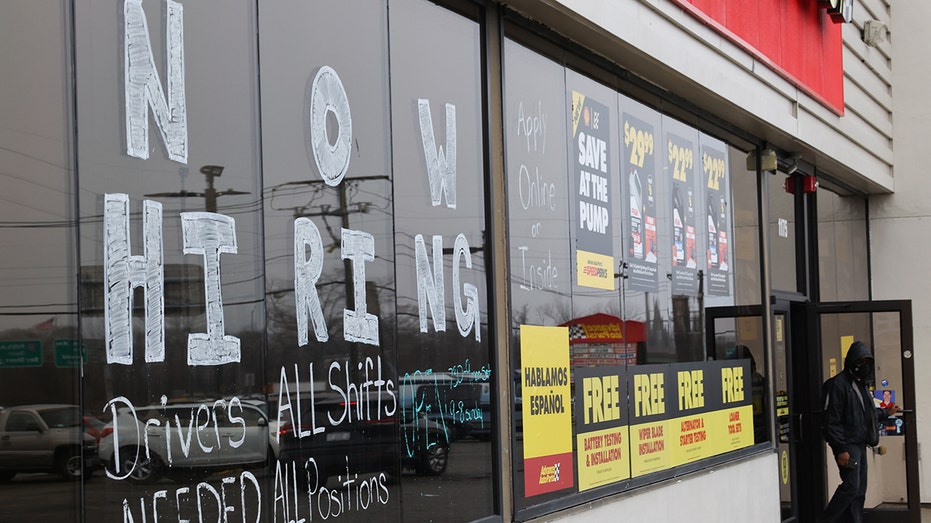Workers changing jobs are receiving massive pay increases, analysis shows
Nearly one-quarter of job switchers received a signing bonus
US labor secretary on 'good' March jobs report
Labor Secretary Marty Walsh ackowledges there is 'work to do' on the jobs front, but argues overall the March employment report was 'strong.'
Americans who switched jobs this year are often receiving double-digit pay increases, according to a new survey, underscoring how the tightest labor market in years has empowered workers – while also fueling inflation.
A new ZipRecruiter survey shows that 64.2% of recently hired Americans received a pay raise at their new jobs, compared with just 21% who actually saw a wage cut. Among those workers who received a wage hike, nearly half – about 47.9% – received a substantial raise of 11% or more.
S&P 500 ABOUT TO FALL SHARPLY AS IT TEETERS ON BRINK OF BEAR MARKET, MORGAN STANLEY SAYS
On top of that, 22% of job switchers reported getting a signing bonus. Among first-time hires, the number is actually even higher at 33%.
"This is really remarkable," said Julia Pollak, chief economist at ZipRecruiter. "Before the pandemic, these kinds of bonuses were rare."

A large "Now Hiring" advertisement posted on the windows of the Advance Auto Parts store in Bay Shore, New York, on March 24, 2022. (Steve Pfost/Newsday RM via Getty Images / Getty Images)
Bonuses were previously used infrequently to recruit top talent in the most senior roles, Pollak said; in 2000 for instance, just 4% of private-sector workers had received a signing incentive, according to Labor Department data. What's more, prior to February 2020, only 2% to 3% of jobs on ZipRecruiter explicitly offered signing bonuses in their job postings. That figure is now about 12%.
The data emphasizes how newly empowered workers are quitting their jobs in favor of better wages, working conditions and hours as businesses lure new workers with higher salaries – a trend dubbed the "Great Resignation." As a result, Americans' incomes are rising across the board as employers have ramped up hiring to offset the losses or try to out-compete other businesses for workers.
The Labor Department reported last month that 4.4 million Americans, or about 2.9% of the workforce, quit their jobs in February. Meanwhile, the number of job openings fell slightly to 11.3 million by the end of February – the third-highest level on record. In fact, the number of available jobs has topped 10 million for seven consecutive months; before the pandemic began in February 2020, the highest on record was 7.7 million.
As a result, wages are rising across the board: Annual wage growth for the average worker hit 6% in March, according to the Federal Reserve Bank of Atlanta’s wage tracker. That's up from 3.4% in the year-ago period.

A hiring sign is displayed outside a retail store in Buffalo Grove, Illinois, on June 24, 2021. (AP Photo/Nam Y. Huh, File / AP Newsroom)
The concern is that higher wages are exacerbating already sky-high inflation, which surged 8.5% in March from the previous year, according to the Labor Department. Some economists have warned that rising wages could fuel even higher inflation – a jarring possibility, given that consumer prices already surged 7.5% in January, the fastest pace since February 1982.
The combination of high inflation and rising wages has fueled concern about the possibility of a wage-price spiral, a 1970s-style phenomenon where high inflation leads to pay hikes, which in turn lead to more spending and more expensive prices.
Federal Reserve Chairman Jerome Powell has warned of growing supply-and-demand imbalances in the labor market, with the unemployment rate tumbling from to 3.6% in March from 6% the previous year.
"It’s too hot. It’s unsustainably hot," Powell said last week during an annual meeting between the International Monetary Fund and the World Bank. "It’s our job to get it to a better place where supply and demand are closer together."
GET FOX BUSINESS ON THE GO BY CLICKING HERE
As a result, the Fed is taking an increasingly hawkish approach to fighting inflation, which is at the highest level since December 1981. Policymakers raised rates by a quarter-percentage point in March, and have since signaled that sharper, half-point increases are likely in the coming months, beginning in May.
"It is appropriate to be moving a little more quickly," Powell said. "I also think there’s something in the idea of front end-loading whatever accommodation one thinks is appropriate. So that points in the direction of 50-basis points being on the table."





















